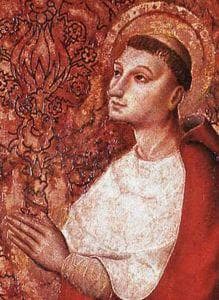
Blessed Peter Of Luxembourg
Blessed
Feast Day: July 2
Biography
Blessed Peter of Luxembourg, also known as Peter of Metz, was born in 1369 in Lorraine, France. He was the son of Guy of Luxembourg, the count of Ligny, Belgium. Unfortunately, Peter's life took a tragic turn when he was orphaned at the tender age of four. Despite this hardship, he was raised in Paris, France, where he received a solid education.
Peter's journey to priesthood began when he became a canon at various prestigious cathedrals, including Notre Dame, Chartres, and Cambrai. His dedication to his faith and his strong commitment to the Church led to his appointment as the Archdeacon of Dreux, France. However, the tumultuous events of his youth continued to shape his life.
When Peter was in his early teens, he was held hostage by the English in exchange for the return of his brother. This experience undoubtedly had a profound impact on Peter, exposing him to the harsh realities of political conflicts and power struggles during that time.
Despite these challenges, Peter's piety and devotion to his calling were undeniable. At the astonishingly young age of fourteen, he was consecrated as the Bishop of Metz, France, in the year 1384. His youth and inexperience did not deter him from assuming the responsibilities of his episcopal role, and he quickly became known for his efforts in reforming his diocese.
In 1386, at just sixteen years old, Peter was created a cardinal of San Georgio, Velabro by the decree of the anti-pope Clement VII. This appointment marked his involvement in the political and ecclesiastical conflicts of the time. In an attempt to claim his see, Peter enlisted the aid of armed troops, leading to a confrontation with the forces loyal to Pope Urban VI. It is important to note that Peter chose the side of Clement VII in the papal schism, aligning himself against the established Pope Urban VI.
Despite his sincere intentions and personal holiness, Peter's role in the political struggles ultimately proved disastrous for him. He was forcibly driven out of Metz and sought refuge in Avignon, where Clement VII resided. It was in Avignon, in the year 1387, that Peter of Luxembourg succumbed to a fever and passed away at the Carthusian monastery in Villeneuve. He was still in his teens at the time of his death, having barely begun to scratch the surface of his potential.
Blessed Peter of Luxembourg was widely recognized for his personal austerity, deep prayer life, and genuine piety. Although he found himself entangled in political and ecclesiastical turmoil beyond his control, his sanctity could not be overlooked. Even though he had chosen the wrong side in the dispute over the papacy, Peter's beatification came relatively quickly. Pope Clement VII bestowed this honor upon him in 1527, acknowledging his remarkable holiness despite his unfortunate circumstances.
Throughout his life, Blessed Peter of Luxembourg was known for his representations in art. These include depictions of him presenting a donor to the Virgin, standing before the crucifix, and as a young cardinal with a shield bearing a rampant lion nearby.
The feast days designated to honor Blessed Peter of Luxembourg differ slightly, with July 2nd being recognized universally, and some calendars also noting July 4th or 5th. His life continues to inspire and serves as a reminder of the profound impact a person can have on others, even in the face of overwhelming challenges.